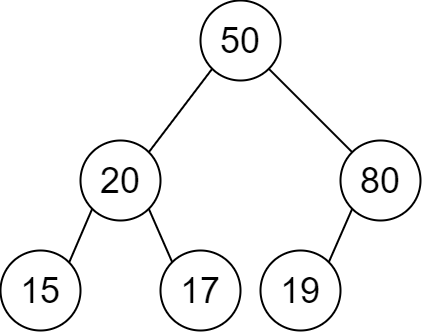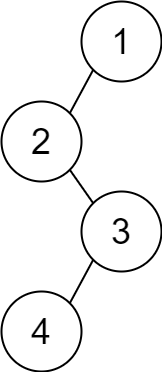树
数组
哈希表
二叉树
题目描述
给你一个二维整数数组 descriptions ,其中 descriptions[i] = [parenti , childi , isLefti ] 表示 parenti 是 childi 在 二叉树 中的 父节点 ,二叉树中各节点的值 互不相同 。此外:
如果 isLefti == 1 ,那么 childi 就是 parenti 的左子节点。
如果 isLefti == 0 ,那么 childi 就是 parenti 的右子节点。
请你根据 descriptions 的描述来构造二叉树并返回其 根节点 。
测试用例会保证可以构造出 有效 的二叉树。
示例 1:
输入: descriptions = [[20,15,1],[20,17,0],[50,20,1],[50,80,0],[80,19,1]]
输出: [50,20,80,15,17,19]
解释: 根节点是值为 50 的节点,因为它没有父节点。
结果二叉树如上图所示。
示例 2:
输入: descriptions = [[1,2,1],[2,3,0],[3,4,1]]
输出: [1,2,null,null,3,4]
解释: 根节点是值为 1 的节点,因为它没有父节点。
结果二叉树如上图所示。
提示:
1 <= descriptions.length <= 104 descriptions[i].length == 31 <= parenti , childi <= 105 0 <= isLefti <= 1descriptions 所描述的二叉树是一棵有效二叉树
解法
方法一
Python3 Java C++ Go TypeScript Rust
1
2
3
4
5
6
7
8
9
10
11
12
13
14
15
16
17
18
19
20
21
22
23 # Definition for a binary tree node.
# class TreeNode:
# def __init__(self, val=0, left=None, right=None):
# self.val = val
# self.left = left
# self.right = right
class Solution :
def createBinaryTree ( self , descriptions : List [ List [ int ]]) -> Optional [ TreeNode ]:
g = defaultdict ( TreeNode )
vis = set ()
for p , c , left in descriptions :
if p not in g :
g [ p ] = TreeNode ( p )
if c not in g :
g [ c ] = TreeNode ( c )
if left :
g [ p ] . left = g [ c ]
else :
g [ p ] . right = g [ c ]
vis . add ( c )
for v , node in g . items ():
if v not in vis :
return node
1
2
3
4
5
6
7
8
9
10
11
12
13
14
15
16
17
18
19
20
21
22
23
24
25
26
27
28
29
30
31
32
33
34
35
36
37
38
39
40
41
42 /**
* Definition for a binary tree node.
* public class TreeNode {
* int val;
* TreeNode left;
* TreeNode right;
* TreeNode() {}
* TreeNode(int val) { this.val = val; }
* TreeNode(int val, TreeNode left, TreeNode right) {
* this.val = val;
* this.left = left;
* this.right = right;
* }
* }
*/
class Solution {
public TreeNode createBinaryTree ( int [][] descriptions ) {
Map < Integer , TreeNode > m = new HashMap <> ();
Set < Integer > vis = new HashSet <> ();
for ( int [] d : descriptions ) {
int p = d [ 0 ] , c = d [ 1 ] , isLeft = d [ 2 ] ;
if ( ! m . containsKey ( p )) {
m . put ( p , new TreeNode ( p ));
}
if ( ! m . containsKey ( c )) {
m . put ( c , new TreeNode ( c ));
}
if ( isLeft == 1 ) {
m . get ( p ). left = m . get ( c );
} else {
m . get ( p ). right = m . get ( c );
}
vis . add ( c );
}
for ( Map . Entry < Integer , TreeNode > entry : m . entrySet ()) {
if ( ! vis . contains ( entry . getKey ())) {
return entry . getValue ();
}
}
return null ;
}
}
1
2
3
4
5
6
7
8
9
10
11
12
13
14
15
16
17
18
19
20
21
22
23
24
25
26
27
28
29
30
31
32 /**
* Definition for a binary tree node.
* struct TreeNode {
* int val;
* TreeNode *left;
* TreeNode *right;
* TreeNode() : val(0), left(nullptr), right(nullptr) {}
* TreeNode(int x) : val(x), left(nullptr), right(nullptr) {}
* TreeNode(int x, TreeNode *left, TreeNode *right) : val(x), left(left), right(right) {}
* };
*/
class Solution {
public :
TreeNode * createBinaryTree ( vector < vector < int >>& descriptions ) {
unordered_map < int , TreeNode *> m ;
unordered_set < int > vis ;
for ( auto & d : descriptions ) {
int p = d [ 0 ], c = d [ 1 ], left = d [ 2 ];
if ( ! m . count ( p )) m [ p ] = new TreeNode ( p );
if ( ! m . count ( c )) m [ c ] = new TreeNode ( c );
if ( left )
m [ p ] -> left = m [ c ];
else
m [ p ] -> right = m [ c ];
vis . insert ( c );
}
for ( auto & [ v , node ] : m ) {
if ( ! vis . count ( v )) return node ;
}
return nullptr ;
}
};
1
2
3
4
5
6
7
8
9
10
11
12
13
14
15
16
17
18
19
20
21
22
23
24
25
26
27
28
29
30
31
32
33
34 /**
* Definition for a binary tree node.
* type TreeNode struct {
* Val int
* Left *TreeNode
* Right *TreeNode
* }
*/
func createBinaryTree ( descriptions [][] int ) * TreeNode {
m := make ( map [ int ] * TreeNode )
vis := make ( map [ int ] bool )
for _ , d := range descriptions {
p , c , left := d [ 0 ], d [ 1 ], d [ 2 ]
if m [ p ] == nil {
m [ p ] = & TreeNode { Val : p }
}
if m [ c ] == nil {
m [ c ] = & TreeNode { Val : c }
}
if left == 1 {
m [ p ]. Left = m [ c ]
} else {
m [ p ]. Right = m [ c ]
}
vis [ c ] = true
}
for v , node := range m {
if ! vis [ v ] {
return node
}
}
return nil
}
1
2
3
4
5
6
7
8
9
10
11
12
13
14
15
16
17
18
19
20
21
22
23
24
25
26
27
28
29
30
31
32
33
34
35
36
37
38
39
40
41
42
43
44 /**
* Definition for a binary tree node.
* class TreeNode {
* val: number
* left: TreeNode | null
* right: TreeNode | null
* constructor(val?: number, left?: TreeNode | null, right?: TreeNode | null) {
* this.val = (val===undefined ? 0 : val)
* this.left = (left===undefined ? null : left)
* this.right = (right===undefined ? null : right)
* }
* }
*/
function createBinaryTree ( descriptions : number [][]) : TreeNode | null {
const map = new Map < number , [ number , number ] > ();
const isRoot = new Map < number , boolean > ();
for ( const [ parent , child , isLeft ] of descriptions ) {
let [ left , right ] = map . get ( parent ) ?? [ 0 , 0 ];
if ( isLeft ) {
left = child ;
} else {
right = child ;
}
if ( ! isRoot . has ( parent )) {
isRoot . set ( parent , true );
}
isRoot . set ( child , false );
map . set ( parent , [ left , right ]);
}
const dfs = ( val : number ) => {
if ( val === 0 ) {
return null ;
}
const [ left , right ] = map . get ( val ) ?? [ 0 , 0 ];
return new TreeNode ( val , dfs ( left ), dfs ( right ));
};
for ( const [ key , val ] of isRoot . entries ()) {
if ( val ) {
return dfs ( key );
}
}
return null ;
}
1
2
3
4
5
6
7
8
9
10
11
12
13
14
15
16
17
18
19
20
21
22
23
24
25
26
27
28
29
30
31
32
33
34
35
36
37
38
39
40
41
42
43
44
45
46
47
48
49
50
51
52
53
54
55
56
57
58
59
60 // Definition for a binary tree node.
// #[derive(Debug, PartialEq, Eq)]
// pub struct TreeNode {
// pub val: i32,
// pub left: Option<Rc<RefCell<TreeNode>>>,
// pub right: Option<Rc<RefCell<TreeNode>>>,
// }
//
// impl TreeNode {
// #[inline]
// pub fn new(val: i32) -> Self {
// TreeNode {
// val,
// left: None,
// right: None
// }
// }
// }
use std :: rc :: Rc ;
use std :: cell :: RefCell ;
use std :: collections :: HashMap ;
impl Solution {
fn dfs ( val : i32 , map : & HashMap < i32 , [ i32 ; 2 ] > ) -> Option < Rc < RefCell < TreeNode >>> {
if val == 0 {
return None ;
}
let mut left = None ;
let mut right = None ;
if let Some ( & [ l_val , r_val ]) = map . get ( & val ) {
left = Self :: dfs ( l_val , map );
right = Self :: dfs ( r_val , map );
}
Some ( Rc :: new ( RefCell :: new ( TreeNode { val , left , right })))
}
pub fn create_binary_tree ( descriptions : Vec < Vec < i32 >> ) -> Option < Rc < RefCell < TreeNode >>> {
let mut map = HashMap :: new ();
let mut is_root = HashMap :: new ();
for description in descriptions . iter () {
let ( parent , child , is_left ) = ( description [ 0 ], description [ 1 ], description [ 2 ] == 1 );
let [ mut left , mut right ] = map . get ( & parent ). unwrap_or ( & [ 0 , 0 ]);
if is_left {
left = child ;
} else {
right = child ;
}
if ! is_root . contains_key ( & parent ) {
is_root . insert ( parent , true );
}
is_root . insert ( child , false );
map . insert ( parent , [ left , right ]);
}
for key in is_root . keys () {
if * is_root . get ( key ). unwrap () {
return Self :: dfs ( * key , & map );
}
}
None
}
}
GitHub




